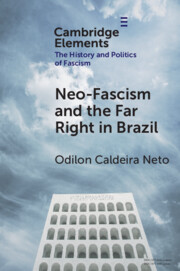References
Alcantara, S. R. (2015). Skinheads White Power na América do Sul: A internacionalização do discurso nacional-socialista da Blood & Honour. Revista Espaço Acadêmico, 15(175), pp. 18–26.
Almeida, A. (2004). Skinheads: Os “mitos ordenadores” do Poder Branco paulista. Master’s dissertation (Mestrado em Ciências Sociais) – Programa de Pós-Graduação em Ciências Sociais. Pontifícia Universidade Católica de São Paulo.
Almeida, A. (2013). Divisão 18: A identidade de resistência de uma organização Skinhead White Power argentino-brasileira. Revista Contemporâneos, 1(11), pp. 1–21.
Bale, J. (2002). National Revolutionary Groupuscule and the Resurgence of Left-Wing Fascism: The Case of France’s Nouvelle Résistance. Patterns of Prejudice, 36(3), pp. 25–45.
Bertonha, J. F. & Athaídes, R. (2023). The Nazi Party and the German Communities Abroad: The Latin American Case. London: Routledge.
Boisard, S. (2014). Pensando as direitas na América Latina objeto científico, sujeitos e temporalidades? Varia Historia, 30(52), pp. 85–100.
Bull, A. C. (2012). Neo-Fascism. In Bosworth, R. J. B., ed., The Oxford Handbook of Fascism. Oxford: Oxford University Press, pp. 586–605.
Caldeira Neto, O. (2017). A “direita envergonhada” e a fundação do Partido de Reedificação da Ordem Nacional. Historiæ, 7(2), pp. 79–102.
Caldeira Neto, O. (2019). “Adeus, Verde esperança!”: Integralismo e a morte de Plínio Salgado. Locus: Revista De História, 25(1), pp. 1–19.
Carneiro, M. R. da S. R. (2012). Uma velha novidade: O integralismo no século XXI. Boletim do Tempo Presente, 3, pp. 1–26.
Chirio, M. (2018). Politics in Uniform: Military Officers and Dictatorship in Brazil, 1960–1980. Pittsburgh: University of Pittsburgh Press.
Copsey, N. (2020). Neo-Fascism: A Footnote to the Fascist Epoch? In Iordachi, C. and Kallis, A., eds., Beyond the Fascist Century. London: Palgrave Macmillan, pp. 102–121.
Costa, M. R. (2000). Os Carecas do Subúrbio: caminhos de um nomadismo moderno. São Paulo: MUSA.
Costa Pinto, A. (2019). Latin American Dictatorships in the Era of Fascism: The Corporatist Wave. London: Routledge.
Dreifuss, R. (1989). O jogo da Direita. Rio de Janeiro: Editora Vozes.
Farias, J. A. (2023). A Extrema-Direita explosiva: Anticomunismo e atentados na distensão da Ditadura Civil-Milita. Locus: Revista De História, 28(2), pp. 351–375.
Finchelstein, F. (2019). Do fascismo ao populismo na história. São Paulo: Almedina.
Gonçalves, L. P. (2014). The Integralism of Plínio Salgado: Luso-Brazilian Relations. Portuguese Studies, 30(1), pp. 67–93.
Gonçalves, L. P. & Caldeira Neto, O. (2022). Fascism in Brazil: From Integralism to Bolsonarismo. London: Routledge.
Griffin, R. (2003). From Slime Mould to Rhizome: An Introduction to the Groupuscular Right. Patterns of Prejudice, 37(1), pp. 27–50.
Griffin, R. (1991). The Nature of Fascism. London: Pinter Press.
Mammone, A. (2001). Revitalizing and De-Territorializing Fascism in the 1950s: The Extreme Right in France and Italy, and the Pan-National (“European”) Imaginary. Patterns of Prejudice, 45(4), pp. 29–318.
Marchi, R. (2015). A identidade de Portugal no discurso da direita radical: do multirracialismo ao etnonacionalismo. Estudos Ibero-Americanos, 41(2), pp. 422–442.
Motta, R. P. S. (2020). On Guard Against the Red Menace: Anti-Communism in Brazil, 1917–1964. Liverpool: Liverpool University Press.
Mudde, C. (2019). The Far Right Today. Cambridge: Polity Press.
Napolitano, M. (2018). The Brazilian Military Regime, 1964–1985. Oxford Research Encyclopedia of Latin American History.
Pierucci, A. F. (1987). As bases da nova direita. Novos Estudos Cebrap, iss. 19.
Power, T. J. (2000). The Political Right in Postauthoritarian Brazil: Elites, Institutions, and Democratization. University Park: Pennsylvania State University Press.
Rodrigues, L. M. (1987). Quem é quem na Constituinte: Uma análise sociopolítica dos partidos e deputados. São Paulo: OESP-Maltese.
Santos, E. H. de J. (2022). Ativismo e extrema-direita no meio militar: Tensões e discursos que antecedem o bolsonarismo (1984–1998). Brasiliana: Journal for Brazilian Studies, 10(2). https://doi.org/10.25160/bjbs.v10i2.128414. Shigunov, G. H. (2021). “Nossa Guerra contra vocês”: Identitarismo e o caso da Legião Identitária. Anais: IV Seminário Internacional História do Tempo Presente, Florianópolis, pp. 1–15.
Traverso, E. (2018). Las nuevas caras de la derecha. Buenos Aires: Siglo XXI.
Valdez, R. S. (2024). Um nacionalismo transnacional? Estudo de caso da Nova Resistência, organização neofascista brasileira. Dissertation (Mestrado em Sociologia), Universidade Federal do Rio Grande do Sul.
Vasconcelos, F. T. R. (2023). A dissidência tradicionalista: A reinvenção da extrema direita brasileira como aliança “vermelho-marrom.” Almanaque de Ciência Política, 7(2), pp. 1–29.
Von Beyme, K. (1988). Right-Wing Extremism in Post-War Europe. West European Politics, 11(2), pp. 1–18.
Zúquete, J. P. (2018). The Identitarians: The Movement Against Globalism and Islam in Europe. Notre Dame: University of Notre Dame Press.



